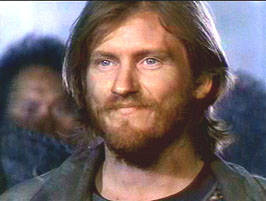Can’t We All Just Get Along?
But do The Demolished Man and Demolition Man really exist in different universes?
Both the 50s book and the 90s movie deal with men living outside of social norms. Edgar Friendly, despite being filthy, violent and played by Denis Leary, is sympathetic. The audience nods their heads at his crude libertarianism, even though the politically correct society of San Angeles is largely harmless. Spartan, the movie’s hero, empathizes with him – and since he, a man of the 90s, is the lens through which a 90s audience interacts with the film’s future, we are meant to empathize as well.
I’m into freedom of speech and freedom of choice. I’m the kind of guy likes to sit in a greasy spoon and wonder – “Gee, should I have the T-bone steak or the jumbo rack of barbecued ribs with the side order of gravy fries?” I want high cholesterol. I wanna eat bacon and butter and buckets of cheese, okay? I want to smoke a Cuban cigar the size of Cincinnati in the non-smoking section. I want to run through the streets naked with green Jell-o all over my body reading Playboy magazine. Why? Because I suddenly might feel the need to, okay, pal?
I’ve seen the future. Do you know what it is? It’s a 47-year-old virgin sitting around in his beige pajamas, drinking a banana-broccoli shake, singing “I’m an Oscar Meyer Wiener”.

And bring back the gold standard!
And yet, as harmless as Dr. Cocteau’s San Angeles claims to be, Edgar Friendly can not live in it. A culture which seeks a stable status quo cannot tolerate a loud outsider. Society rejects the iconoclast, either through laws (as in San Angeles) or through custom and ostracism (“did you smell that guy on the subway? ugh“).
Ben Reich, protagonist and villain of The Demolished Man, is similarly singular. The psychic detective tracking him, Linc Powell, makes this point himself – that Reich may be one of those rare individuals who can buck the system and threaten the entire galaxy. Reich is smart enough to:
- Get away with murder (it’s not easy);
- … of an obvious rival
- … in a society filled with telepaths
- … with the greatest psychic detective on the planet on to him.
That type of genius comes rare in 21st century America. But in the future depicted by Alfred Bester, it’s even rarer. Humanity has been lulled into complacency by savvy media moguls and the machinations of corporate enterprise. When Reich wants his employees to stop gambling in the company cafeteria, he goes to a jingle writer and pays her for a catchy jingle that’ll turn them off cards and dice. People are either clay to be manipulated or Espers – and even the telepaths have their own petty squabbles for status. A man like Ben Reich is one in a billion.

Behold, I will teach you the Demolition Man!
Both The Demolished Man and Demolition Man tell the story of how the social order reacts to people outside the status quo. John Spartan, in Demolition Man, is met with condescending politeness at first, followed by gradual hostility from Cocteau and the Powers That Be. Ben Reich, in The Demolished Man, suffers the amassed law enforcement personnel of an entire galaxy against him. Both these men are criminals: Spartan for “murdering” civilians in the 90s, then for swearing a lot in 2032; Reich for murder as well.
So the ultimate conflict isn’t between John Spartan and Ben Reich, but between each of these men and the society in which they live. In Demolition Man, thesis (Spartan) reconciles with antithesis (San Angeles) to form synthesis: a society in which Edgar Friendly can live above ground. He gets to make out with Lt. Huxley as a reward. I won’t spoil the ending of The Demolished Man – I suspect fewer people have read that than saw the Stallone movie – but things do not end well there, either.
In the end, society is the irresistible force, and few of us are truly immovable against it. We are not Demolition Men; we are Demolished ourselves.
Hmmm….
Alfred Bester also a character name in Babylon 5 who happens to be a Telepath. I see a small hommage going on.
The Espers Guild = Psi Corps.
!m!
Here’s the speech from Denis Leary…
http://www.youtube.com/watch?v=JizGkM6gbvQ
Another thing of note is that this was Leary’s heyday. When perich says, “The audience nods their heads at his crude libertarianism, even though the politically correct society of San Angeles is largely harmless. Spartan, the movie’s hero, empathizes with him – and since he, a man of the 90s, is the lens through which a 90s audience interacts with the film’s future, we are meant to empathize as well.”
He’s spot on. Leary was the type of man that could sing “I’m an asshole” http://www.youtube.com/watch?v=zPnv8UvKFzc .
The reason I bring this up is the comparison between the 50s and 90s. In the 50s, things looked really good – Babyboomers, low unemployment, American pride from winning the WWII, nationalism vs. the Ruskies. In the 90s, things looked really good, Gen X, low unemployment, American pride from winning the Cold War, and lots of coke up the nose. (OK, so the coke part didn’t happen as much in the 50’s).
There’s an ebb and flow to the watered down good and the libertarian good moving together.
If only I could find out who was the 50’s Denis Leary was and what did he say?
@Marc: The homage is deliberate in Babylon 5’s case. I meant to find a photo of Walter Koenig in Psi Corps mufti to sprinkle in the piece, but it slipped my mind. Cred goes to you!
@Darin: Lenny Bruce was the 50s Denis Leary.
More to your point, there’s an interesting undercurrent of “yes, but do we have it too good?” in both of those pieces. Political correctness – the defining feature of San Angeles – is the kind of thing you can only worry about if you have lots of well-fed, employed, contented people. Ditto marketing jingles in the 50s.
So the nominal utopias in which Bester and, um, Peter Lenkov set their respective stories wouldn’t look so bad if viewed through, say, the late 40s or late 60s.
Hrm, methinks I’m gonna have to go get myself a copy of The Demolished Man – sounds like a fascinating book.
@Darin:
Lenny Bruce would be the ’50s Dennis Leary.